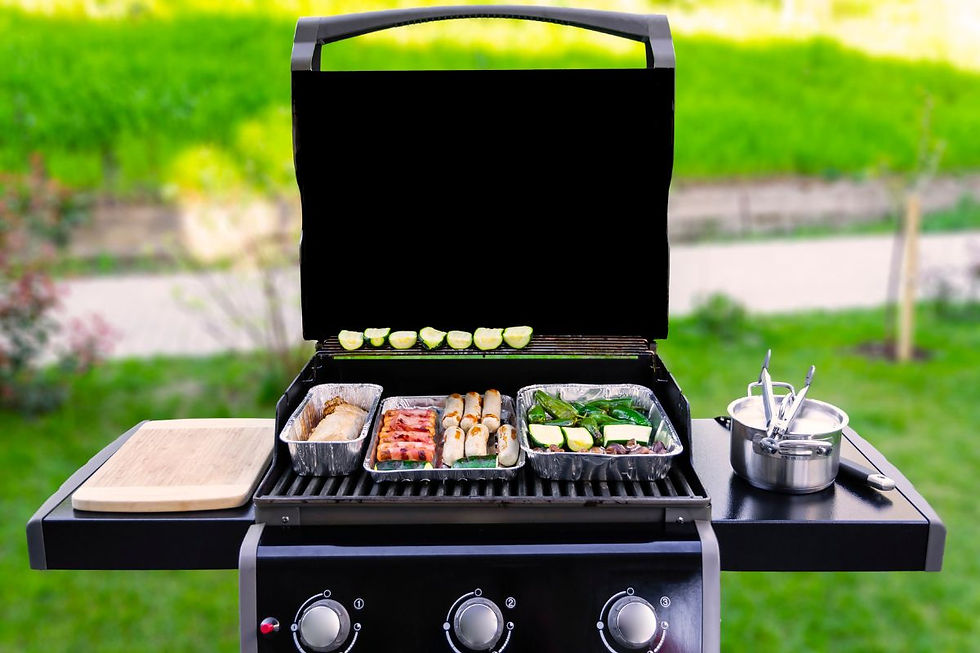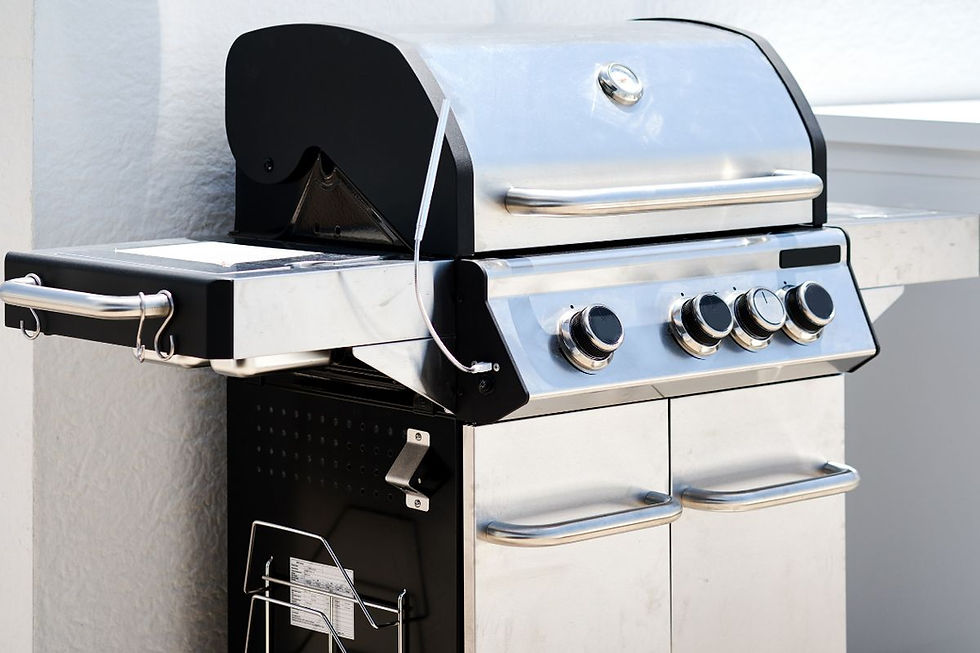Best Non-Toxic Gas Grills (Safe, Durable & Worth the Investment)
- Our Editors – Zenda Guide

- Aug 19, 2025
- 7 min read
Updated: Jan 24
Reviewed by Our Editors at Zenda Guide
Our content follows our Editorial Standards and is evaluated using the Zenda Lab Protocol.

Grilling brings people together — from weekend barbecues with friends to simple weeknight dinners outside. But not all grills are created equal. Many popular models use cheap coatings, questionable metals, or designs that increase flare-ups — all of which can release toxins or make your food less safe.
At Zenda Guide, we believe outdoor cooking should be joyful without hidden risks. That’s why we researched today’s top gas grills to highlight options that are non-toxic, durable, and designed for healthier cooking. Whether you’re a family looking for a safe backyard staple or a home chef ready to invest in a premium model, this guide will help you find a grill that lasts — and one you can trust.
Want to grill cleaner and smarter? Start with understanding the healthiest grill types. Table of contents
Why “Non-Toxic” Matters in Gas Grills
The term non-toxic isn’t always obvious when it comes to grills. Here’s what we mean:
Safer Materials → Look for 304 stainless steel, porcelain enamel, or cast iron. Avoid cheap metals and PFAS-coated non-stick parts that can degrade with heat.
Fewer Flare-Ups → Poorly designed burners can lead to grease flare-ups, producing harmful compounds (PAHs, HCAs). Safer grills control airflow and manage drips better.
Stable Design → Sturdy carts and covered burners reduce risks of tipping, leaks, and burns.
Choosing a safer grill isn’t about perfection — it’s about reducing exposure where you can, while still enjoying the foods you love.
How We Choose Our Recommended Gas Grills
Not all gas grills are built the same — especially when it comes to materials exposed to high heat and open flames. That’s why every grill featured here is selected using the Zenda Lab Protocol, our evidence-based approach for evaluating material safety, durability, and real-world grilling performance.
Instead of relying on marketing claims or BTU numbers alone, we focus on what matters most: what touches your food, how evenly the grill cooks, and how well it holds up over time.
Affiliate Disclosure
This post contains Amazon affiliate links. As an Amazon Associate, we earn from qualifying purchases. Our picks follow the Zenda Lab Protocol for evaluating materials, durability, and buyer satisfaction.
Editor’s Picks: Best Non-Toxic Gas Grills
1. Weber Genesis E-325 Gas Grill (Premium Pick)
A premium gas grill built for serious grilling, long-term durability, and material safety at high heat.
The Weber Genesis E-325 is one of the best gas grills you can buy if you want consistent performance, safer materials, and a grill that’s designed to last well over a decade. With stainless steel internals, a cast-aluminum firebox, and excellent heat control, it sets the benchmark for non-toxic gas grilling.
Why we like it
Porcelain-enameled cast iron grates with no PTFE
Stainless steel burners and Flavorizer bars
Cast-aluminum firebox resists rust and warping
Excellent heat consistency and flare-up control
12-year warranty on key components
Considerations
Higher upfront investment
Larger footprint than entry-level grills
Specs
Burners: 3 (stainless steel)
Total cooking area: ~787 sq. in.
Fuel: Liquid propane
Warranty: Up to 12 years

2. Weber Spirit E-315 Gas Grill (Best Overall Balance)
A reliable, well-built gas grill that delivers excellent safety, durability, and everyday performance.
The Weber Spirit E-315 offers many of the same safety and material advantages as the Genesis line in a slightly more compact and affordable package. It’s a great choice for households that grill regularly and want predictable results without unnecessary features.
Why we like it
Porcelain-enameled cast iron grates (heat-stable, no nonstick coatings)
Stainless steel burners with even heat distribution
Cast-aluminum firebox for long-term durability
Excellent temperature control for everyday grilling
10-year warranty
Considerations
Smaller cooking area than premium models
Fewer stainless upgrades than Genesis
Specs
Burners: 3
Total cooking area: ~529 sq. in.
Fuel: Liquid propane
Warranty: Up to 10 years

3. Monument Grills Mesa 415BZ (Best Large Grill for the Price)
A powerful, stainless-forward gas grill offering excellent size and features at a more accessible price.
The Monument Grills Mesa 415BZ is ideal if you want a large cooking surface, strong heat output, and stainless steel internals without paying premium-brand pricing. While it doesn’t match Weber’s long-term durability, it delivers impressive performance for the cost.
Why we like it
Large cooking surface for families and entertaining
Stainless steel burners and flame tamers
Strong heat output with fast preheating
Stainless steel exterior panels
Excellent value for its size
Considerations
Steel firebox is less durable than cast aluminum
Porcelain-coated grates require maintenance to prevent wear
Specs
Burners: 4 (stainless steel)
Total cooking area: ~723 sq. in.
Fuel: Liquid propane
Warranty: Up to 8 years (burners)

4. Char-Griller E3001 Grillin’ Pro (Best Budget Large Gas Grill)
A spacious, powerful gas grill for buyers who want size and output at a lower price point.
The Char-Griller E3001 offers generous cooking space and strong heat for backyard grilling on a budget. While it requires more upkeep than premium grills, it’s a solid option for occasional to regular grillers who want more room without overspending.
Why we like it
Large grilling surface with side burner
Porcelain-coated cast iron grates (no PTFE)
Strong heat output for searing
Good value for families and gatherings
Considerations
Steel body is more prone to rust if not covered
Shorter warranty and lifespan than premium brands
Specs
Burners: 3 + side burner
Total cooking area: ~630 sq. in.
Fuel: Liquid propane
Warranty: Limited

5. Char-Broil Performance TRU-Infrared (2-Burner) (Best Compact Option)
A compact gas grill designed to reduce flare-ups and deliver more even cooking.
The Char-Broil TRU-Infrared system uses stainless steel emitter plates to distribute heat evenly and minimize flare-ups. This makes it a good choice for smaller spaces or users who prefer controlled cooking over high-power searing.
Why we like it
TRU-Infrared stainless steel heat system
Porcelain-coated cast iron grates (no nonstick coatings)
Reduced flare-ups and even heat
Compact footprint for patios and small yards
Considerations
Smaller cooking area
Requires regular cleaning of infrared plates
Specs
Burners: 2
Total cooking area: ~300 sq. in.
Fuel: Liquid propane
Warranty: Up to 5 years (burners)

Key Features to Look For in a Safe Gas Grill
Before you buy, keep these factors in mind:
Materials: Choose stainless steel (304 grade preferred), porcelain enamel, or cast iron. Avoid grills with “mystery coatings.”
Fuel Type: Propane is convenient and portable, while natural gas is cheaper long-term and produces fewer emissions.
Size & Stability: Consider cooking needs and safety — stable carts, locking wheels, and sturdy lids matter.
Heat Control: Good burners reduce flare-ups and keep cooking even. Look for models with multiple zones.
Warranty: A longer warranty often signals higher build quality.
Best Non-Toxic Gas Grills — Comparison Table
Model | Safety + PVS Score |
Weber Genesis E-325 Shop now | Excellent Safety — PVS 9.4/10 Premium materials & long lifespan |
Weber Spirit E-315 | Excellent Safety — PVS 9.1/10 Reliable, durable everyday grilling |
Monument Grills Mesa 415BZ | Strong Safety — PVS 8.6/10 Large, powerful, value-focused |
Char-Griller E3001 | Strong Safety — PVS 8.1/10 Big surface on a budget |
Char-Broil TRU-Infrared | Strong Safety — PVS 8.1/10 Compact with reduced flare-ups |
FAQ: Gas Grills & Safety Questions
Is gas grilling healthier?
Yes — compared to charcoal, gas grilling produces fewer PAHs (polycyclic aromatic hydrocarbons) and HCAs (heterocyclic amines). Choosing the right materials and avoiding flare-ups makes it safer still.
Which type of grill is the healthiest?
Gas grills are generally healthier than charcoal, while electric can be the cleanest option. Within gas grills, stainless steel and enameled designs are safest.
Are expensive gas grills worth it?
Often, yes. Premium grills use higher-quality stainless steel, offer better heat control, and last longer — reducing waste and long-term costs.
Propane vs natural gas: which is better?
Propane is portable and powerful, but natural gas is cheaper per use and produces fewer emissions. For safety, ensure connections are properly installed.
What are the disadvantages of gas grills?
They can be pricier upfront, require gas refills or hookups, and improper use can lead to leaks or fires. Choosing a stable, well-built grill reduces these risks.
Final Thoughts
Cooking outdoors should feel effortless, safe, and enjoyable. By choosing a gas grill made from non-toxic, durable materials and designed with safety in mind, you’re investing in healthier meals and lasting memories—not just another piece of equipment.
At Zenda Guide, we don’t expect perfection—just progress. If you’re ready to upgrade your outdoor cooking setup, explore our picks above and find the one that fits your space and lifestyle.
→ Also see: Best Non-Toxic Cookware Sets
Want more calm, practical tips on sustainable living, home design, and conscious product choices?
→ Join the Zenda Guide newsletter for curated product recommendations and fresh ideas delivered monthly.
About our editorial process
Zenda Guide reviews are produced by our Editorial Board using a documented methodology focused on durability, materials, and long-term value. Learn more about our Editorial Standards and Zenda Lab Protocol







Comments